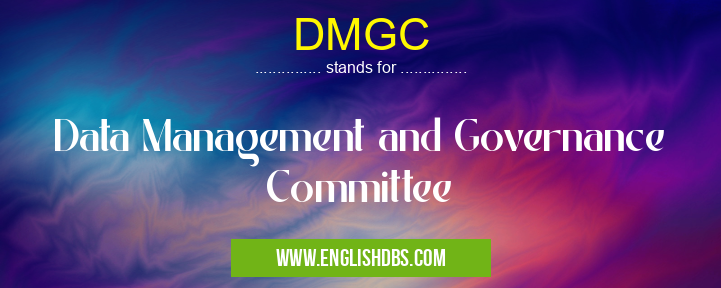What does DMGC mean in MANAGEMENT
DMGC (Data Management and Governance Committee) plays a vital role in establishing and overseeing data management and governance practices within an organization. This committee's primary objective is to ensure that data is managed effectively, securely, and in compliance with regulatory requirements.

DMGC meaning in Management in Business
DMGC mostly used in an acronym Management in Category Business that means Data Management and Governance Committee
Shorthand: DMGC,
Full Form: Data Management and Governance Committee
For more information of "Data Management and Governance Committee", see the section below.
» Business » Management
Key Responsibilities
- Data Management:
- Develop and implement policies and procedures for data collection, storage, usage, and retention.
- Establish standards for data quality, accuracy, and consistency.
- Ensure compliance with data privacy and security regulations.
- Data Governance:
- Define data ownership, stewardship, and accountability within the organization.
- Establish data governance frameworks and processes to guide data-related decision-making.
- Monitor and review data governance practices to ensure alignment with business objectives.
Key Functions
- Data Strategy Development:
- Collaborate with business units to define data needs and develop data strategies.
- Identify and prioritize data management and governance initiatives.
- Policy and Standards Management:
- Develop and enforce policies and standards for data management and governance.
- Review and update policies and standards as needed.
- Data Security and Compliance:
- Oversee data security measures and ensure compliance with relevant regulations.
- Monitor and mitigate data security risks.
- Data Quality and Integrity Management:
- Establish and monitor data quality metrics.
- Implement data cleansing and validation processes.
- Data Governance Education and Awareness:
- Educate stakeholders about data management and governance practices.
- Foster a culture of data stewardship and responsibility.
Essential Questions and Answers on Data Management and Governance Committee in "BUSINESS»MANAGEMENT"
What is Data Management and Governance Committee (DMGC)?
DMGC is a committee responsible for establishing and overseeing data management and governance policies and practices within an organization. It ensures that data is handled consistently, securely, and in compliance with regulations.
What are the primary responsibilities of a DMGC?
The primary responsibilities of a DMGC include:
- Developing and implementing data governance policies and standards
- Managing data quality and consistency
- Ensuring data security and privacy compliance
- Establishing data retention and disposal guidelines
- Overseeing data-related projects and initiatives
Who typically participates in a DMGC?
DMGC members typically include representatives from various stakeholders across the organization, including:
- IT professionals
- Data stewards
- Business unit leaders
- Legal counsel
- Compliance officers
How often should a DMGC meet?
The frequency of DMGC meetings depends on the size and complexity of the organization. Generally, it is recommended to meet quarterly or semi-annually to review progress, discuss data-related issues, and make decisions.
What are the benefits of having a DMGC?
A well-functioning DMGC can provide numerous benefits, including:
- Improved data quality and accuracy
- Enhanced data security and privacy
- Reduced data-related risks and costs
- Increased data transparency and accessibility
- Better decision-making based on reliable data
Final Words: The DMGC serves as a critical body in organizations by providing strategic direction and oversight for data management and governance. By establishing and enforcing policies and standards, the DMGC ensures that data is managed effectively, securely, and in compliance with regulatory requirements. This ultimately supports business decision-making, improves data quality, and minimizes data-related risks.
